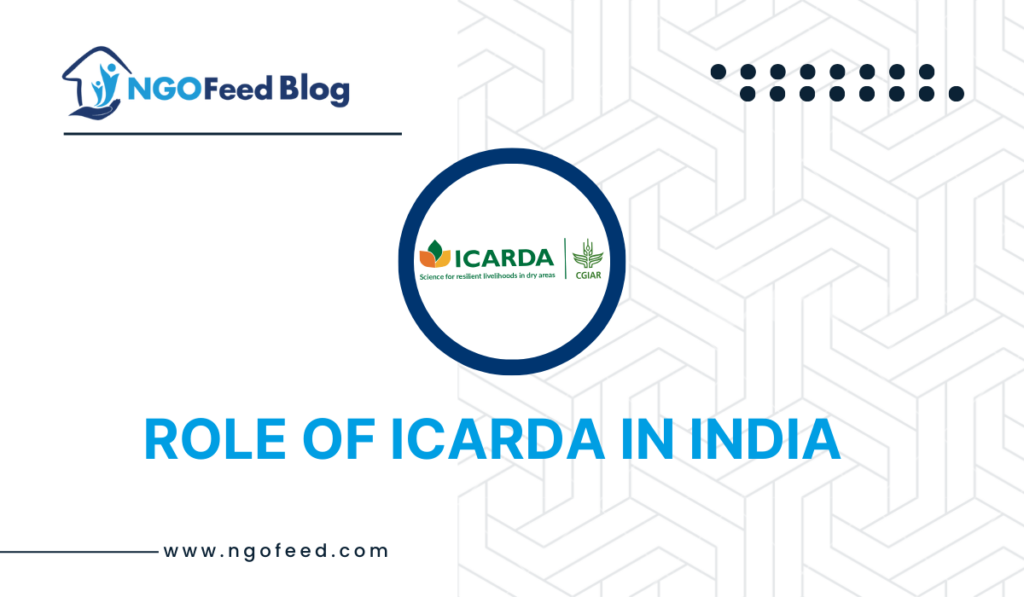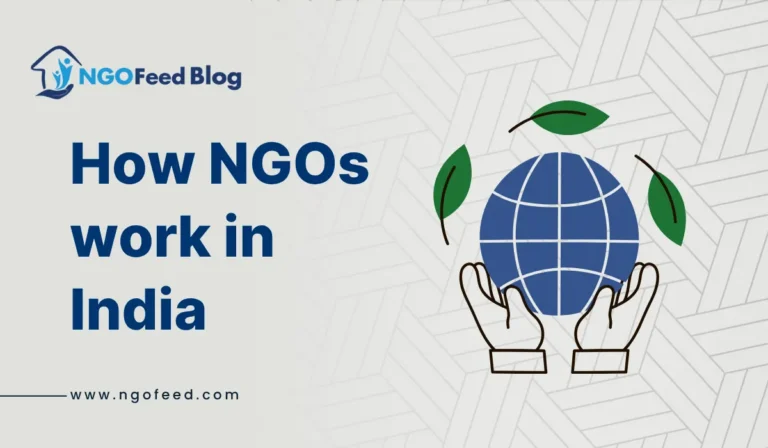Role of ICARDA in India: The full form of ICARDA is The International Center for Agricultural Research in the Dry Areas (ICARDA). The ICARDA has been a key institution in the promotion of agricultural research and development for dry areas and areas characterized by low rainfall. ICARDA was founded in 1977, as a member of the CGIAR, its main aim is to work towards increasing food security, improving the well-being of people, and building up the capacity to adapt to climate change through research in agriculture.
India with its wide areas of agro-ecological regions has been one of the active partners for ICARDA in meeting the challenges of the dryland farmers. Including advanced scientific and technological knowledge and advancement, ICARDA has contributed to India’s core themes to increase crop yield, water use efficiency, and develop sustainable and adapted production systems. Their endeavors are much in line with the proposed policies of feeding the Indian population as well as pushing the Indian agriculture and rural economy into higher growth.
Table of Contents
Major activities have included the enhancement of different wheat, barley, and legume varieties as well as optimality in the management of water and soil resources. This has been enhanced through interactions and collaborations with Indian organizations such as the ICAR (Indian Council of Agricultural Research) to enhance the generation and dissemination of improved rice knowledge.
In focusing on ICARDA paraphernalia, but more so ICARDA’s interventions and influence on Indian agriculture, this article elucidates how the institute impacts sustainable development initiatives and efforts to strengthen smallholder farmers beyond a narrow concentration on climate variability.
Also Read: Role of UNWTO in Tourism
What is ICARDA?
The challenge here is the International Center for Agricultural Research in the Dry Areas, which is an international organization aimed at improving agricultural research and development of the dry zones. Created as ICRISAT in 1977 as one of the 15 original centers in the CGIAR System, ICARDA is dedicated to developing scientific solutions to the problems of the dry areas of the world – areas with little access to water, poor soils, or subject to abiotic stresses due to climate change. It aims at creating value for smallholder farmers through producing and implementing appropriate technologies for enhancing agricultural production and food productivity for better livelihoods, within the context of environmental change.
The major research themes of the institute are to identify new and improved crop varieties to be resilient to climatic stresses, water and soil management practices, and appropriate agricultural technologies adaptable to dry areas. Emblematically, ICARDA operates in the regions of the Middle East, North Africa, Central Asia, and South Asia owing to its partnership with the government, research body, and development agency for developing the global significance of the institute.
Also Read: Role of UNECE in India
What is the importance of ICARDA’s Collaboration with India?
Throughout the country, India has large areas such as arid and semi-arid zones many problems such as water deficiencies, variability in rainfall, and eroded soil affect agriculture production and feedback. These challenges make ICRADA’s partnership with India important in addressing them. Through collaborations with Indian agricultural organizations including the Indian Council of Agricultural Research- ICAR, ICARDA has brought innovation and research to Indian dryland agriculture.
From this partnership, advanced varieties of crops, especially wheat, barley, lentils, and chickpeas which have high resistance to water stress and pests have been achieved. Also, the Integrated Fisher management followed by the modern HYV seeds from private sectors has assisted Indian farmers to double yields in some cases, and soil fertility management from ICARDA has encouraged farmers to use limited resources to increase yields.
The current cooperation also focuses on capacity development activities that would foster mutual sharing of knowledge and resources, and train Indian researchers and farmers on how to counter climate volatility. This syndicate has meaningfully built the robustness, productivity, and sustainability of the agricultural terrain in India.
Also Read: Role of UNHRC in India
What is the Role of ICARDA in India?
The Role of ICARDA in India
It is demonstrated that the International Center for Agricultural Research in the Dry Areas (ICARDA) is an important contributor to the improvement of the sustainable agriculture in India, especially in the zone of the dryland and semi-arid climate. By so doing they have effectively addressed issues to do with the scarcity of water climate change, and soil degradation thereby helping in the improvement of food security and improving the well-being of farmers in India.
Breeding for better and better varieties of crops is an important goal of plant breeding. In recent years ICARDA has been helpful in popularizing and establishing high fetching, drought, and pest-resistant crops like wheat, barley, chickpeas, and lentils. These innovations have assisted farmers in the water-scarce zones to attain increased production even in unfavoured environmental conditions.
Improvement of Water and Soil Resources
Advanced and water-efficient irrigation methodologies and soil management practices are advocated by ICARDA to enable effective utilization of the few available resources. Irrigation technologies and augmented soil fertility have enabled Indian farmers to sustain agricultural outputs.
Also Read: Role of UNAIDS in India
This mini-program is a MOU with Indian institutions.
ICARDA has been working in collaboration with academic institutions in India such as the Indian Council of Agricultural Research (ICAR) as well as other associated regional and international agricultural research organizations, universities, and institutions in pursuit of the exchange of knowledge and skills as well as developing and implementing joint research projects.
Combating Climate Change
The various climate-resilient farming systems and strategies developed and recommended by ICARDA have equipped Indian agriculture to cope with some of the factors influencing the farming season such as extreme and variable weather.
Empowering smallholder farmers
Through the dissemination of technologies, capacities for training, as well as other frameworks related to agriculture, ICARDA has supported farmer productivity enhancement, targeting the vulnerable dryland subtopics farmers most.
Also Read: Role of UNCDF in India
The analysis shows that the work of ICARDA in India is crucial to supporting the transformation of agriculture for its sustainable and more resilient future in the context of increasing environmental pressure.
Partnerships with Indian Institutions.
I believe that the primary reason local institutions in India have not promoted partnerships with organizations from other countries is that they are either directly funded by the Indian government or indirectly funded through the Indian government.
ICARDA has been able to make significant progress towards enhancing sustainable agriculture in India mainly because of key partnerships with premier Indian organizations. Such partnerships have enabled the production of appropriate agricultural interventions to address complex problems affecting dryland farmers. Together, ICARDA and its partners have built research capabilities, provided new technologies, and promoted structured farming systems across the country.
Interaction with ICAR (Indian Council of Agricultural Research)
ICARDA-ICAR partnership is a primary mode through which ICARDA carries out its work in India. In this regard, ICAR is the apex organization for agricultural research and education in India and has made a good framework of institutional collaboration to which ICARDA can ensure the effective implementation of its research programs throughout the country.
Also Read: Role of the UNO in India
Key areas of collaboration include:
- Crop Improvement: Synchronized endeavors have brought forth high-producing and stress-borne high-quality varieties of wheat, barley, chickpeas, and lentils suitable for India’s dry area environs.
- Technology Dissemination: The above-mentioned ICARDA and ICAR collaborate to unlock advanced farming techniques and methods for farmers in India.
- Policy Support: This informs policies to deal with some of the wishes in agriculture especially in the arid and semi-arid areas.
Research and Partnership-Building Collaborations
ICARDA suggests focusing on India partnering in multi-disciplinary research in response to climate variation, and water and soil stresses. These projects focus on practical solutions, such as:
- Efficient water usage, and;
- Improving soil nutrients through the use of organic and inorganic fertilization.
- Experiencing climate-smart techniques of cropping.
Also Read: Role of IFPRI in India
Another key area of ICARDA’s activity is capacity development. More specifically, via training, seminars, or shows, and the effectiveness of diverse practices through field visits, Indian researchers, extension personnel, and farmers are empowered with skills and knowledge to improve sustainable methods of farming. These initiatives enable translating innovations to users and tangible use in the fields that in effect impact the farmers and support the forward and growth of Indian agriculture.









